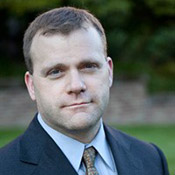Search
Main menu
Jacques Chris Rudell

Education
- University of California, Berkeley, PhD (Electrical Engineering)
- University of California, Berkeley, MS (Electrical Engineering)
- University of Michigan, Ann Arbor, BS (Electrical Engineering)
Biography
Dr. Jacques Rudell joined the EE department as an Assistant Professor, in January 2009. He received a B.S. degree in electrical engineering from the University of Michigan, Ann Arbor and an MSEE and PhD, from UC Berkeley. From 1989 to 1991, he was an IC Designer and Project Manager with Delco Electronics (now Delphi), where he focused on bipolar analog circuits for automotive applications. From 2000 to 2001, he was a postdoctoral Researcher at the University of California at Berkeley, in addition to holding consulting positions in several Silicon Valley firms. In early 2002, he joined Berkana Wireless (now Qualcomm), San Jose, CA as an Analog/RF IC Design Engineer and later became the Design Manager of the Advanced IC Development Group. From 2005 to 2008, Dr. Rudell worked in the Advanced Radio Technology Group, at Intel, where his work focused mainly on RF transceiver circuits and systems, in advanced silicon processes.
In 1999, Dr. Rudell was the recipient of the Demetri Angelakos Memorial Achievement Award given by the EECS department at UC Berkeley. He received the 1998 ISSCC Jack Kilby Best Student Paper Award and was the co-recipient of the 2001 ISSCC Lewis Best Paper Award. He also received the 2008 ISSCC award for best evening session. In addition, Dr. Rudell is on the technical program committee for the International Solid-State Circuits Conference (ISSCC), serves on the MTT-IMS Radio Frequency Integrated Circuits (RFIC) Symposium steering committee, and he currently serves as an Associate Editor for the Journal of Solid-State Circuits.
My group's research focus will cover a broad range of topics related to analog, mixed-signal, RF and mm-wave circuits. The emphasis of our work will focus on novel architectures and circuits which overcome the challenges presented by future low-cost, silicon technologies, such as ultra-low voltage, low-intrinsic device gain, and poor matching characteristic, to name a few. Some of my past work has been on integrated circuits for wireless communication systems requiring aggressive performance. A major emphasis of our future research will explore architectures and circuits for highly integrated, concurrently operating, heterogeneous-wireless systems which overcome the evolving challenges associated with co-existence. Other areas of research which I have an interest are mm-wave circuits for 60GHz and imaging applications, low-voltage highly-efficient transmitter systems, ultra-low power RF for cellular based sensor networks, high-speed I/O for chip-to-chip and core-to-memory applications and finally, integrated circuits for bio-medical applications.
Research Interests
- Co-existence of heterogeneous programmable systems (Co-existences of highly programmable, heterogeneous wireless systems on the same platform or silicon)
- Low-voltage Analog and Mixed-Signal circuits (Circuits implemented in modern nanometer length processes. This work will focus on circuits which allow for inherently low-gain, low-voltage technologies.)
- Low Power RF for Cellular Systems (Ultra-low power circuits for cellular based systems)
- mm-Wave Circuits & Systems (mm-Wave CMOS circuits for communication and imaging)
- High-Speed I/O (High-speed electrical chip-to-chip, core-to-core, and core-to-memory interfaces in CMOS processes)
Future Analog Systems Technologies (FAST) Lab: http://www.ee.washington.edu/research/fast/


